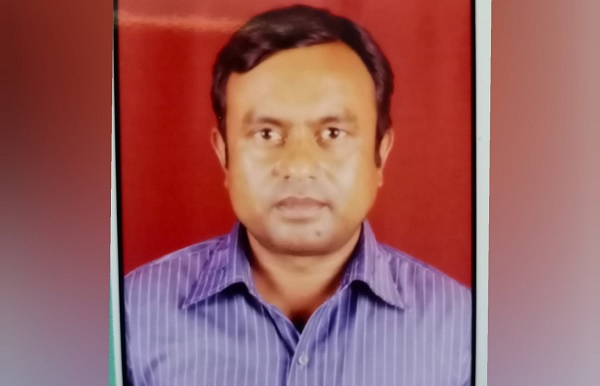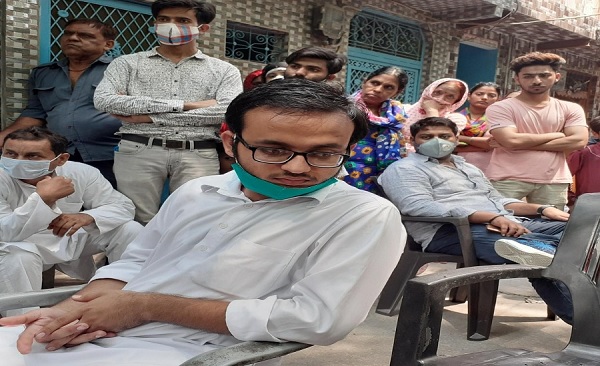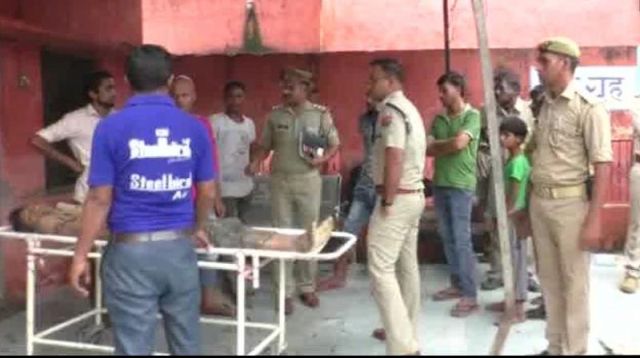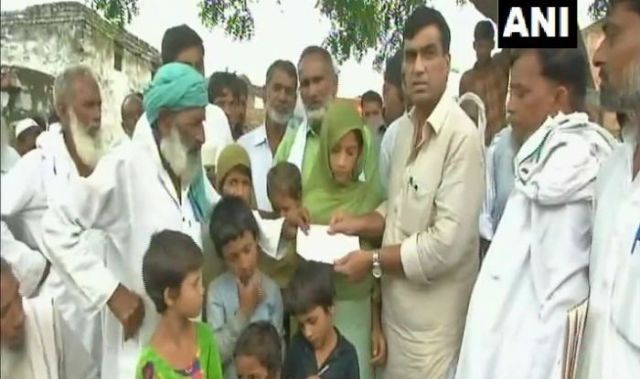
by admin | May 25, 2021 | Muslim World

Aftab Alam was murdered on Sunday night while driving his cab from Bulandshahr to Delhi
“I want to cry. This is wrong,” Sarla Devi, 70, who is Alam’s next-door neighbour, says. “I do not know what they get from forcing people to chant ”Jai Shree Ram.”
Zafar Aafaq | NEW DELHI
A pall of gloom has descended on Block 35, Trilokpuri, a mixed neighbourhood of Hindus and Muslims in East Delhi. A stretch of the lane is filled with men and a few women sitting on chairs, with their heads downcast, mourning the loss of the locality’s “most gentle” resident.
At around 7 pm, Aftab Alam dropped Parul Sharma in Bulandshahr and left for home in Trilokpuri. Some 30 km on the highway, he made a phone call to his son Mohd Sabir, 21, and asked him to recharge his highway toll tag.
Minutes later, Alam again called Sabir to tell him that his toll tag was not working. He paid Rs 120 there. He did not drop the call but kept mum. Instead, Sabir heard some chatter from the other end and learnt that his father was talking with some men inside his cab.
“After a couple of minutes, I started recording the call,” said Sabir who felt something ominous. “They were using invectives and also asking my father about his religion.”
Sabir says the men forced his father to give them a lift. He claims they were drunk and were trying to force Alam to drink. He told them he was Muslim to which they said they knew Muslims who drink.
After 8 minutes into the recording, the men ask Alam to chant ‘Jai Shree Ram’. Sabir says his father agreed as he said the slogan translates as ‘Glory to Ram’. After about 45 minutes the call dropped.
Distraught by anxiety, Sabir incessantly dialled Alam’s number; “over 50 times in half an hour.” His phone was ringing but there was no response.

Aftab’s son Mohd Sabir
Sabir, his grandfather and an uncle hurried to the police station near their home in Mayur Puri. But, Sabir says, the duty officer was unfriendly. “He did not help much despite repeated pleas. He told us to call the police station on our own.”
Then after some time, a plainclothes officer Sanjay came who heard them patiently and also helped with tracking the Alam’s phone close to Chitera village in district Gautam Budha Nagar.
At around 10 pm, they drove towards Bulandshahr. When they reached near Chitera around midnight, Sabir recounts, he saw two cops standing near a cab which he identified as his father’s.
The cops told them that their father had received mild injuries and he was undergoing treatment in hospital but the cops asked them to report at the Badlapur police station first.
The policemen questioned Sabir for an hour despite his repeated requests to be allowed to meet his father. “They made us wait for long before taking us to the hospital.”
At the hospital, they were struck by trauma when hospital staff showed a fully-wrapped body. When Sabir removed the cover from his face, it was his father.
“I cannot describe what I saw. His head had two deep gashes, on front and back, blood was oozing from his ears, his throat had strangulation marks,” Sabir sobs, his eyes welled up, while recalling.
Later, the police recorded the ‘Panchnama’. “After seeing my father’s body, we were traumatised and I do not know what the police wrote in the complaint that time.”
Thereafter they, along with Alam’s body, were taken to a mortuary in Sector 94, Noida. The body was handed over to the family after almost 12 hours after the post mortem.
Alam was buried at the graveyard after Asr prayers.
‘Peaceful Neighbourhood’
On Tuesday morning, neighbours Sarla Devi and Krishna were seen consoling Najm-un-Nissa, Alam’s mother, while their own eyes were moist. “I want to cry. This is wrong,” Devi, 70, who is Alam’s next-door neighbour, says. “I do not know what they get from forcing people to chant ‘”Jai Shree Ram.”
“When I heard he had been murdered, I cried a lot,” She describes Alam as the “most gentle man” of the locality. “I have never heard him shout or quarrel with anyone.”
Alam’s family comes from Bihar while Devi hails from Gorakhpur, Uttar Pradesh. The two families have been neighbours for over 25 years. They share their happiness and grief with one another. “We live in peace and together observe our festivals, be it Holi, Eid or Diwali,” says Alam’s brother Tasleem. “We have had peace here even in the days of Delhi riots in February”.
The neighbourhood respected Alam for giving quality education to his sons. In Alam’s death, the family lost a caretaker who wanted his sons to go ahead in life. “My father was working hard to pay for our quality education,” says Sabir whose two brothers are undergoing coaching for admission in top medical and engineering colleges.
‘We Want Justice’
The police have filed a case in the Badlapur police station under FIR No. 0371 and invoked Sections 302 for murder and 394 for robbery.
The police did not treat it as a case of hate crime but the family says, Alam was killed because he was a Muslim. “The call recording shows they were forcing him to chant Hindu slogans,” says Sabir and asserts that this is a crucial evidence to prove that his father was “lynched” by an organised “gang of extremists.”
Sabir says that there were no marks of violence on the car. “Everything inside the car was in order,” he says, “My father was dragged down and then beaten brutally to death.”
But the police told them they recovered the lifeless Alam on the front passenger seat with the seat belt tied. But the family is not ready to accept this claim. “It is possible that cops have put him in that seat. Where would the assailants have the time to get to do that after murder, ” they ask.
Sabir says that a police officer called and told him that he had photographs of the three men suspected of being involved in the murder. “Police have also retrieved CCTV footage from the toll plaza which shows one of the men getting down from the cab. He is seen donning a checked shirt.”
The family insists that the police should investigate it as a case of hate crime. “We are planning to file a fresh complaint of mob lynching,” says Sabir. “We want Justice.”
The story first appeared in the clarionindia.net

by admin | May 25, 2021 | News, Politics
 New Delhi : The Supreme Court on Friday asked the Centre and States to give wide publicity on radio, television and other media platforms to its direction that lynching and mob violence of any kind will invite serious consequence under the law.
New Delhi : The Supreme Court on Friday asked the Centre and States to give wide publicity on radio, television and other media platforms to its direction that lynching and mob violence of any kind will invite serious consequence under the law.
The top court by its July 17 judgment had directed the Central and the state governments to “broadcast on radio and television and other media platforms including the official websites of the Home Department and Police of the states that lynching and mob violence of any kind shall invite serious consequence under the law.”
The bench of Chief Justice Dipak Misra, Justice A.M. Khanwilkar and Justice D.Y. Chandrachud directed the Centre and the state governments to carry out its July 17 direction as Attorney General K.K. Venugopal informed the court that a Group of Ministers (GoM) is considering the nature of legislation to be brought to deal with the crime of lynching by the vigilante groups.
The top court by its July 17 judgment had recommended to Parliament to create a separate offence for lynching and provide adequate punishment for the same as a special law would instil a sense of fear for law among the people involved in vigilantism and lynching.
Directing all the state governments and Union Territories to comply with its July 17 direction that provides for preventive, remedial and punitive steps to deal with the lynching crime, the court said that the home secretaries of the states and the UTs that would fail to file report on the compliance of its direction would be directed to appear before the court in person.
The court order came as senior counsel Indira Jaising told the court that only nine States and two Union territories have filed the compliance report.
Besides this, the court sought report from Rajasthan on the steps taken backed with documents against the police officials for delay in taking Rakbar Khan, a victim of lynching to hospital resulting in his death.
Rakbar Khan, 28, was beaten to death by suspected cow vigilantes in Lalwandi village of Ramgarh district in Rajasthan on July 24.
Rajasthan on Thursday informed the court that SHO of the police station concerned has been suspended. The court was also informed that three constables of the police station have been transferred to police lines.
—IANS

by admin | May 25, 2021 | News
 Lucknow : A man was beaten to death by a mob in Bareilly, Uttar Pradesh, early on Thursday on suspicion of stealing their cattle, police said.
Lucknow : A man was beaten to death by a mob in Bareilly, Uttar Pradesh, early on Thursday on suspicion of stealing their cattle, police said.
Superintendent of Police Abhinandan Singh said three persons have been arrested.
The victim was identified as Shahrukh Khan (20), who worked as a tailor in Dubai and had come home for Eid.
The incident happened in Bholapur Hindoliya village where more than 50 persons attacked four young men when they found them in their cattle yard. The youths were thrashed by the mob and handed over to the police later.
The villagers have filed an FIR against Shahrukh and two others, alleging cattle theft.
Police say there were three persons in all who were involved in the theft of buffaloes from the cattle yard of a local Gajendra Pal. When they along with other neighbours Virendra, Khempal and Mukesh Kumar started a hunt for the missing buffaloes, they spotted these four young men trying to cross the Nakatiya river.
The other two alleged thieves Pappu and Abid of the Thiriya Nijawat Khan village knew how to swim and fled while Shahrukh was stranded on the banks.
Villagers attacked him and beat before handing him over to the police.
He was admitted to the district hospital around 7:30 am where he died in front of his family members and relatives. The post-mortem report has revealed that the 20-year-old died of internal injuries inflicted primarily to the liver and kidneys.
The victim’s family members have refuted charges of theft and informed the police that Shahrukh had gone out late night after receiving a phone call rom one of his local friends.
“The police informed us later about the incident. We found him in the district hospital,” a family member said.
There have since been two FIRs: one from Gajendra Pal, who alleged that his buffaloes were being stolen; and the other by family members against two dozen persons accusing them of mob lynching.
Western and central UP have witnessed a few similar cases of mob lynching sparked by cattle theft.
Anand Kumar, Additional Director General of Police (ADG, Law and Order) told IANS that he had sought a report on the incident. “I am awaiting details” he added.
—IANS

by admin | May 25, 2021 | Opinions
 By C. Uday Bhaskar,
By C. Uday Bhaskar,
August 15 this year marks the 71st anniversary of Indian independence. As the Prime Minister unfurls the national flag at the Red Fort, it is a celebratory moment; yet, a certain sense of bleakness and despondency is palpable. There is a deeply ingrained perception that anarchy is spreading in the country and that the state has abdicated in its primary responsibility of ensuring the safety and security of every citizen, irrespective of religion, caste, class and gender. Recent events bear testimony to this mood.
In an unprecedented development, the Attorney General (AG) of India K.K. Venugopal informed the Supreme Court in an anguished manner that there was an incident of major rioting every week in different parts of the country and that they often go unpunished. The AG noted: “Kanwarias (a sect of Hindu pilgrims) are overturning vehicles in Delhi…There is an incident of major rioting every week, even by educated groups. Marathas in Maharashtra, SC/ST (scheduled caste/scheduled tribe)… nothing is done.”
Earlier, a former Chief Justice of India, T.S. Thakur, asked a very pertinent question: “When we see day in and day out, mobs lynching people, it’s a complete failure of rule of law. If a mob can take the law into its hands and administer summary justice, what kind of rule of law is this?”
The sub-text in both cases is that the Indian State has become selective in how it applies the law and that there is a tacit indifference to the safety and welfare of the minority citizenry.
Thus what is disturbing is the pattern that emerges in the disaggregation of the violence that is ostensibly spontaneous — be it the rioting mob, the beef-lynchings or now the Kanwarias, the annual north Indian ritual of carrying water from the Ganga to one’s home.
Thousands of Hindu devotees walk long distances in July-August to collect the sacred water and, over the years, the numbers have been swelling and the entire event has acquired a huge carnival profile with music, dancing, et al. Given the religious significance attached to the event and the majority Hindu sentiment nurtured by the ruling Bharatiya Janata Party (BJP), the Kanwaria pilgrimage also has an electoral relevance. This has clearly become more acute in the run-up to the 2019 national election.
Indian politics and the gradual absorption of the religious leader to high office is exemplified by the election of Yogi Adityanath, a Hindu monk, as the Chief Minister of India’s most populous state of Uttar Pradesh in March 2017. This was a significant development at the time for South Asia, for not even Pakistan, which was created on the basis of religion, had appointed an Islamic cleric to such office.
Thus, in August, India witnessed an unusual spectacle — that of Kanwarias being showered with rose petals from a helicopter by none less than the Uttar Pradesh Chief Minister and senior police officials. That some of these Kanwarias have become a law unto themselves has been brought to the attention of the courts – but as the AG noted, “nothing is done”.
The ascendancy of religious orientation in Indian politics and the BJP’s empathy for unbridled Hindutva (Hindu nationalist) fervour has an electoral dimension to it. Uttar Pradesh is the swing state that will shape the outcome at the in 2019 elections. Thus the pandering to the majority community is predictable — but this comes with a very heavy price.
Citizenship in India is no longer equal and the law, alas, is not applied equitably. On its 71st independence anniversary, one cannot ignore the conjecture that India, which had determinedly rejected the two-nation theory in August 1947, is now moving towards it in a visible manner. The question whether the silent Indian majority, that is Hindu, subscribes to the ugly manifestation of Hindutva and the violence associated with it, remains moot. But the state cannot abdicate and the exhortation of the Attorney General should not be ignored.
(The author is Director, Society for Policy Studies, New Delhi. The article is in special arrangement with South Asia Monitor)
—IANS

by admin | May 25, 2021 | News, Politics

Haryana Waqf Board Chairman Raheesha Khan gives Rs 3 lakh, Haryana government gives a cheque of Rs 5 lakh to Rakbar’s family (ANI)
Chandigarh : The Haryana government on Thursday said Rakbar Khan alias Akbar from Nuh district of the state fell victim to mob lynching in Rajasthan “on mere suspicion of cow smuggling” and announced a total aid of Rs 8 lakh to the next of kin.
Rakbar was a native of Kaul village in Ferozepur Jhirka area of Haryana.
“Haryana Chief Minister Manohar Lal has announced a financial assistance of Rs 5 lakh to Rakbar’s family who was lynched in Alwar on mere suspicion of cow smuggling,” a government statement said.
It said that Haryana Waqf Board Chairman Raheesha Khan has announced assistance of Rs 3 lakh to the family.
“Thus, Rs 8 lakh in total will be provided as assistance by the government.”
Rakbar Khan is survived by his wife, four daughters and three sons.
—IANS






